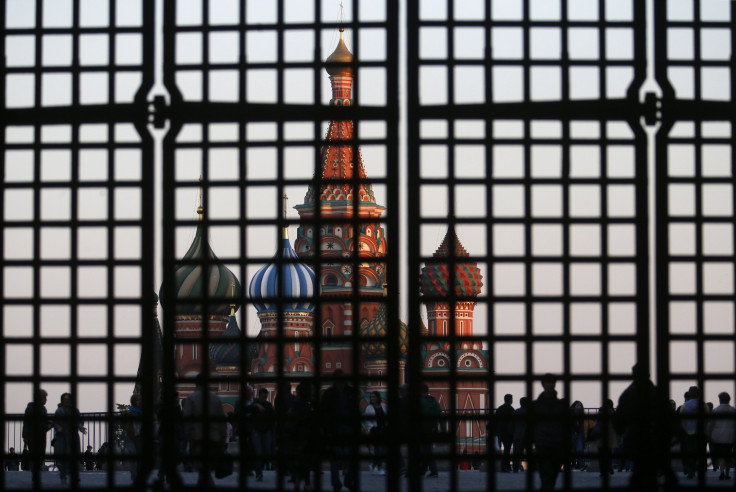Kremlin Mulls Internet 'Kill Switch' To Knock Russia Offline During Emergencies

Russian President Vladimir Putin and members of the Russian security council are reportedly considering a plan that would give the Kremlin the ability to cut off the Russian Internet from the rest of the world’s connection in the event of a national emergency. The plan, which officials say is necessary to protect Russian cybersecurity, has raised fears about tighter Kremlin censorship, though questions remain as to whether a national “kill switch” is even possible.
Reports first surfaced Friday in the Russian business newspaper Vedomosti, with sources saying, “Russian Internet service providers will be required to install equipment that would make it possible to shut off Russia’s access to the global Internet, in the event of an emergency.” The broadly defined “emergency” reportedly includes “military actions” or “serious protest actions,” possibly of the kind that came in the wake of Putin’s return to the presidency in 2012. The security council will also discuss a plan that gives Russia control of the country code top level domains (ccTLDs), the websites ending in “.Ru,” “.рф,” and to a lesser extent “.Su.”
Dmitry Peskov, Putin’s press secretary, denied there’s any intention to isolate Russian users from the global Internet, explaining to the Interfax news agency that the discussions will focus on the ways to protect it “from possible external actions.” Saying later “the actions of our partners in the United States and Europe have recently acquired a certain degrees of unpredictability and we should be prepared for this.”
Peskov, while remaining circumspect, was referring to the ongoing tension between Russia and the West, most recently evidenced by the sanctions imposed on Russia for its aggression in Ukraine. If the U.S. and Europe will target top Russian businessmen, the hugely profitable Gazprom oil monopoly, and other key economic factors, the logic goes, who’s to say they won’t target the Russian Internet?
The latest round of sanctions also came around the same time that former National Security Agency contractor turned whistleblower Edward Snowden revealed during an interview with Wired magazine that the NSA, attempting to monitor Syrian Internet activity, accidentally knocked the entire nation offline.
Whether the plan, which reports indicate is currently little more than a topic for debate, is a reaction to a foreign threat or an excuse to crack down on one of the few remaining outlets for dissent in Russia, though, has been a topic of speculation throughout the Russian media.
“Right now most of the liberal faction in Russia would say they’re just making it up and say this is all sort of a cynical move but at the same time it’s tough to say [the government is] not afraid of the NSA and American hegemony online,” said Kevin Rothrock, a Russian policy analyst and chief editor of RuNet Echo, which aims to increase understanding of the Russian Internet. “If Putin is talking to Snowden and all of a sudden paying more attention, then you do have to think they are concerned.”
The kill-switch possibility also comes after NSA revelations inspired Russian legislation that’s made life more difficult for Silicon Valley companies like Facebook, Google and Twitter, among others. A law enacted in July forces any Web company that stores data belonging to Russian users to keep that information inside Russian borders. That plan was a direct response to the NSA’s defenders, who have asserted that, since the social media companies used by the world have servers in the U.S., American intelligence agencies are within their jurisdiction to look at that data.
The motivation for that law, like the kill-switch possibility, lies in the eye of the beholder. Preventing data collection is either a legitimate way to protect individual Russians, an attempt to influence American companies, a way to boost Russian social networks, or some combination of the three.
Another possible motivation is the Russian government’s longstanding mistrust of the Internet Corporation for Assigned Names and Numbers (ICANN). The U.S.-based body largely manages the infrastructure of the Internet and announced in March that it would transfer control of the Web from the U.S. Department of Commerce to the international community.
ICANN doesn’t have the ability or authority to regulate content or take websites offline, a representative said, and is largely responsible for assigning and maintaining domain names. Yet Anton Nosik, a prominent Russian blogger and security expert, told Russia Behind the Headlines that severing Russia from the rest of the Internet wouldn’t present an insurmountable technical problem.
“In fact, all trunk lines owned by operations operate on a license from the Communications Ministry,” he said.” A breach of license terms results in the license being revoked. Therefore, any Russian Internet provider, having received an instruction from the Communications Ministry to shut down certain channels, will follow it within minutes, just so as not to have its license revoked.”
Still, ICANN has been one of the Kremlin’s favorite targets, with Russian lawmakers complaining that the handover to the international community has been too slow and asserted that ICANN helped the U.S. government orchestrate the Arab Spring.
Those protests, coupled with the mass demonstrations which occurred when Putin assumed the presidency in 2012, has led to a general uneasiness throughout the Putin administration. Along with the aforementioned legislation, a series of laws have been passed that aim to characterize dissent as “extremism,” with the tension over Ukraine only escalating the aim to curb any Western influence.
Rothrock, the Russian Internet analyst, said much of the media has accepted isolation as a serious possibility. Such a drastic measure would lead to lost revenue and an international controversy, he added, although the Russian government has shown little reluctance to take such risks over the past year.
“The invasion of Crimea doesn’t make sense either but it’s very symbolic and it’s very geostrategic,” he said. “They might be ready to swallow that pill if it’s for national security purposes.”
© Copyright IBTimes 2024. All rights reserved.











